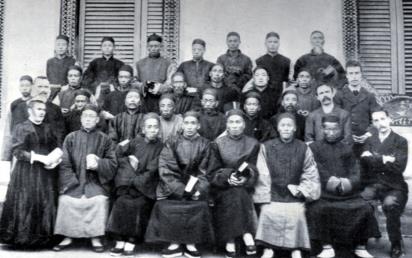1880s

Mounting Opposition
The new decade commenced with fresh hopes that the gospel would rapidly advance among the masses of Zhejiang. Although the overwhelming majority of people in the province had never heard the Name of Jesus Christ, a steady expansion of the work had taken place throughout the 1870s. A survey of Evangelical churches in Zhejiang in 1880 found there to be 69 foreign missionaries, 25 native pastors, 50 churches, and a total of 2,051 believers throughout the province.[1]
One of the chief reasons for this newfound confidence was the way that God had raised up gifted Chinese men to lead the Church in the province. In 1882, the CIM published a letter written by Wen Jiseng, who was the Chinese pastor at Fenghua in northern Zhejiang. In his letter, which was broadly addressed to Christians in Britain. Wen wrote:
"I am now going to write a few words to the brethren in your honorable country, but they must not be looked upon as words of exhortation, because I am one of the Lord's unworthy disciples and I do not understand the truth well.... You English disciples cannot but be more advanced than we Chinese are, because you have had God's truth for so many generations, and have learned it from your childhood, while we have many customs and plans which lead us to trust in our own righteousness; so first I want to ask you to pray for us; to pray God to pour out His Spirit as at Pentecost, and to influence us....
I ought also to thank you foreign brethren because you brought the gospel to us. If you had not brought it we would still be in darkness. There are many of you who labor for us; there are many of you who give much money; there are many of you who pray earnestly for us; and again there are those who wish to come to China to preach the gospel that many Chinese may be saved. For all this I thank you....
Among the hills near Fenghua is a place where many foreigners visit a waterfall. Once, one of the men of this place said to me, 'The foreigners continually come to these hills to look for precious things.' I said, 'No, not to seek precious things, but to seek a cool retreat. The foreigners have one very precious thing which they are willing to give to you.' He asked, 'What thing?' and I replied, 'It is the blood of Jesus Christ.' I then preached the truth of the cross to him, and he listened for a long time."[2]
An expected challenge to the Evangelical churches emerged in the 1880s. The Roman Catholics had been established in Zhejiang for almost three centuries, and were scattered throughout the province. The two groups had previously left one another alone, but by the late 1880s Evangelicals were increasingly frustrated at Catholic interference in their activities. One missionary complained:
"The Romanish Church is manifesting unwanted activity in central and western Zhejiang, in seeking to proselytize native Christians of the Protestant faith. They diligently visit the houses of the converts, and argue, offering many substantial rewards in return for adherence to the Catholic faith. The priests do not hesitate to add falsehood to argument."[3]
Although the first recorded martyrdom of an Evangelical Christian in Zhejiang occurred when Walter Lowrie was killed in 1847, many Chinese believers had faced years of excruciating hardship and persecution from their families and communities. To most Chinese, becoming a Christian was an act of betrayal, as many considered Christianity to be a tool of Western imperialism, a perception which lingers to some degree to the present day.
In the same way that precious pearls are created by constant friction, the body of Christ in Zhejiang was not destroyed by the hardships it encountered, but rather through these setbacks developed stronger character and unity, resulting in widespread growth throughout the province in the 1880s. Testimonies emerged from many parts of Zhejiang, telling of individuals who had experienced the life-changing grace of the Lord Jesus Christ.
Most persecutions against Zhejiang's Christians were never documented, but a few accounts—representative of many more like it—trickled in from the field. When one Christian man in 1886 refused to worship the village idols or contribute to the local heathen festivities, the men of the community seized him. They then "strung him up to a beam, and his right ear and ponytail were cut off, while his life was threatened unless he rejected the doctrines of Jesus. He stood firm; his ear was healed by a medical missionary at Hangzhou, and he is still worshipping and witnessing for Jesus to his countrymen."[4]
The Enemy Strikes Back in Wenzhou
The Evangelical churches in Wenzhou had begun to flourish, and the hunger for spiritual truth in the city and surrounding areas was more intense than in most other parts of China.
With many powerful conversions to Christ occurring throughout the region, it was not long before demonic forces struck back with vengeance against the fledgling churches. An anti-Christian riot erupted in early 1885, with a tearful Grace Stott reporting:
"We have all been burned out of Wenzhou—all our houses, schools, chapels, and everything we possessed, gone and our poor people scattered and troubled on every side.... My husband, the children, and Dr. MacGowan, who came to help them, were pelted with stones all the way....
We feel so deeply thankful that no lives have been lost, that all our other losses seem as nothing. Our greatest sorrow is for our poor people. Many of them are young in the faith. Thirty-nine of them have only this year put on Christ. But He who saved them will keep them.
This is a trial we had never looked for. The Lord was blessing the work. Souls were being saved, and it seemed as if we had nothing to do than sow and reap.... The devil has not crushed faith and hope out of our hearts. We can still sing and feel thankful that we are counted worthy to suffer for His Name's sake. And we know that He will yet bring good out of this seeming evil, and that which has happened to us shall yet be to the furtherance of the gospel. Gladly would we lay down life itself, if only His Name be glorified."[5]
Salt and Light in Zhejiang
While great things were happening as the gospel spread to many parts of Zhejiang, significant challenges were encountered. One struggle was the high rate of illiteracy among new believers, with one missionary lamenting: "Not one in ten of our male members could read when he was converted—an unusual state of things for China, but a fact in Wenzhou. I know just one woman out of the 400 members who could read when she was converted. Thus you see the teaching work among us is very much harder than in some places, because it has to be almost wholly oral."[6]
To help overcome this challenge, God raised up many Christian women who were powerful witnesses to the women and children of Zhejiang. Their vibrant faith in Jesus Christ shone forth through their lives, and even their deaths proved to be opportunities to lead many to repentance. A missionary in Shaoxing, Miss Murray, shared a story about the death of a Christian schoolgirl named De Jing. For weeks De Jing had suffered severe chest pains, and as she gasped for breath, her classmates gathered around her bed. At that point she rallied, and Miss Murray recalled:
"She fixed her beaming eyes on mine, and said, 'Oh, I am so happy! Do not weep. You need not be troubled. You must not weep. I am going to heaven. I am inexpressibly happy. I have seen the Lord! I have seen heaven. It is so good; very, very good!'
'Have your sufferings ceased entirely, then?' I asked. 'Only my chest is sore, but that will soon be over. In heaven there will be no pain, no sorrow—no, not the least. Heaven is so good, inexpressibly good! You cannot even imagine how good it is. Oh, I am happy!'
Looking around at us all, she thanked us repeatedly, saying, 'You need not weep; you must not weep. We shall meet in heaven. Good-bye, good-bye. Meet me in heaven. Its door is very wide, so that whosoever will may enter if they will only trust in Jesus.'
After requesting they sing the hymn Rock of Ages, De Jing gained strength and declared, 'It is wholly on account of Jesus' merit that I am pure. I could do nothing to save myself—no, not the least thing.'
The next morning De Jing told those gathered around her bed, 'When the Lord calls me, I have no pain; when he sends me back, then I have pain. I am going now.'"[7]
De Jing breathed her last breath and life drained away from her body, but her spirit departed to be with the Savior, whom she loved with all her heart. She left behind a room full of startled friends who would never forget what they had seen and heard. The schoolgirls experienced personal revival, and from that point on they exhibited a new passion for sharing the gospel with others.
An insight into the kind of Church God was raising up throughout Zhejiang can be seen in the fascinating accounts of the questions and answers that occurred when Chinese believers applied to be baptized. At Shaoxing, James Meadows recounted some interesting exchanges with new converts. When he examined a young schoolgirl named Ying Wajing and asked her to explain why she wanted to be baptized. Ying replied, "I am a sinner. My heart is sinful, and what I do is sinful." When pressed as to what she intended to do with her sins, Ying answered: "Jesus can forgive them. He shed His blood on the Cross, that sins might be forgiven."
Finally, when it was pointed out that winter was approaching and the water would be so cold that her friends and relatives might try to dissuade her from going through with the baptism, Ying declared, "I don't fear the coldness of the water, neither will I listen to those who wish me to put off joining the Church. I wish to be baptized at this time, please."[8]
Another teenage girl named Xi had been a handful for the staff at the Shaoxing mission school. She was the worst girl in the school, and regularly flew into violent fits of rage and screamed filthy words, which required her to be forcibly carried out of the classroom by her frustrated teachers. She used to mock the Christian girls at the school, calling them "hypocrites" and vowing that she would never believe.
The Christian girls loved Xi and prayed for her salvation every day. Over time, the Holy Spirit softened her heart and convicted her of sin, righteousness and judgment. One day, the leaders of the school were shocked when the troubled teen announced she was a believer in Jesus Christ and that she desired to be baptized. When questioned, Xi was asked where her sins were now. She replied:
"The Lord Jesus has forgiven them. He came from heaven, became a man, shed His blood, and He has great power and great merit, and can save great sinners.... I have truly repented and besought the Lord Jesus to forgive me, and He has forgiven me.... My heart is filled with joy and peace in Jesus; I would like to exhort others to believe in and serve Him."[9]
As the 1880s drew to a close, the China Inland Mission had emerged as a key component in Evangelical missions throughout Zhejiang. By 1883, they reported the following statistics for each region in the province:[10]
- Zhejiang, North (based at Hangzhou) - 197 baptized since 1866
- Zhejiang, North-Central (Shaoxing) - 187 baptized since 1866
- Zhejiang, Central (Jinhua) - 30 baptized since 1875
- Zhejiang, East (Fenghua) - 144 baptized since 1866
- Zhejiang, South-East (Taizhou) - 176 baptized since 1867
- Zhejiang, South (Wenzhou) - 146 baptized since 1867
By 1883, the CIM had accumulated a total of 880 baptized believers during the 17 years they had worked in Zhejiang. The total gradually increased over the next five years, and stood at 978 baptized believers at the start of 1889.[11]
© This article is an extract from Paul Hattaway's book 'Zhejiang: The Jerusalem of China'. You can order this or any of The China Chronicles books and e-books from our online bookstore .
1. Butler, "Protestant Missions in the Cheh-Kiang Province," Chinese Recorder and Missionary Journal (July 1880), p. 288.
2. "Message from a Chinese Pastor," China's Millions (December 1882), p. 151.
3. Chinese Recorder and Missionary Journal (June 1888), p. 289.
4. Mr. Meadows, "The Need of Prayer for Native Christians," China's Millions (December 1886), p. 165.
5. Mrs. George Stott, "The Troubles at Wun-chow," China's Millions (February 1885), p. 24.
6. Edward Hunt, "Encouragements, Difficulties, Needs, at Wen-chow," China's Millions (June 1907), p. 96.
7. "Death Swallowed up in Victory," China's Millions (March 1881), pp. 35-6.
8. Mr. Meadows, "Examination of Chinese Converts," China's Millions (May 1886), p. 57.
9. Meadows, "Examination of Chinese Converts," p. 57.
10. "Report for the Year Ending May 26th, 1883," China's Millions (July 1883), pp. 105-11.
11. China's Millions (July 1889), p. 96.





